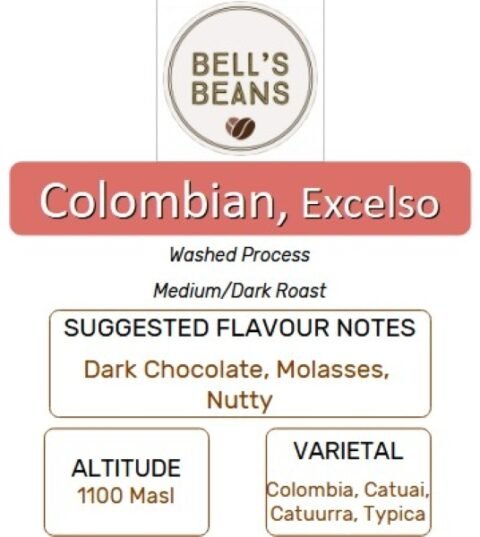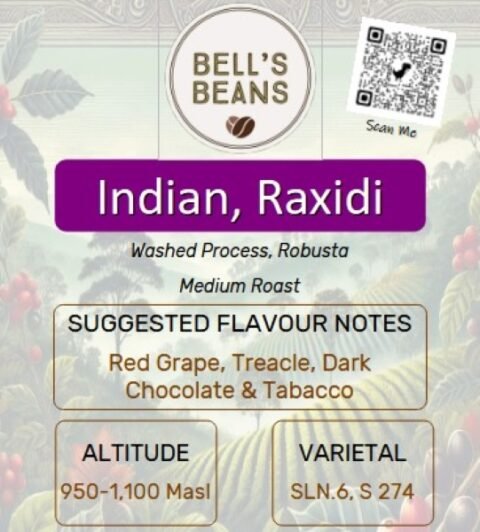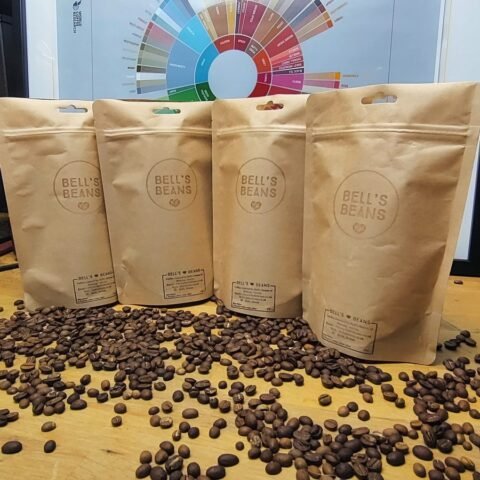Description
BILIGIRIRANGA HILLS EKATA COFFEE & EMERALD HAVEN
Ekata are a team of coffee professionals with an ambition to take Indian specialty coffee to the world. Created by seven childhood friends from Kerala, Ekata started in 2016 with a mission to see
single-origin, shade-grown coffee in biodiverse terroir processed to international standards of quality.
Emerald Haven is a 280 acre plantation, owned and run by the Emerald Group for 15 years. During this time, they have been dedicated to giving back to the community, building schools and
temples.
Working in partnership with Ekata on the post harvest processing, has resulted in this specialty grade coffee. Biligiriranga Hills literally means ‘white hills’ in the local language, Kannada, and refers to the white rock face on one of the largest hills, crowned with the temple of Lord Ranganathaswamy (Lord Vishnu). Located where the Eastern and Western Ghats meet, this is a highly
protected area in the Sathyamangalam Wildlife Sanctuary. It hosts a huge diversity of fauna and flora and has also been a tiger reserve since 2011.
Country: India
Area: Chamarajanagar, Karnataka
Farmer: Ekata Coffee & Emerald Haven
Elevation: 1300-1500 masl
Variety: Chandragiri, S795/S9
Process: Anaerobic Honey
Harvest: November – Febuary
ABOUT SPECIALTY COFFEE IN INDIA
India has been one of the world’s major producers of coffee for a long time – since the days of the Mughal empire, some 200 years before tea was introduced under British colonial rule.
The well-known legend of coffee’s arrival in India has it that 16th century Sufi saint, Baba Budan, so enthused by coffee when travelling through the Middle East during his Hajj, smuggled seven coffee beans from Yemen (supposedly hidden in his beard) and planted them in
Chandragiri, a hilly region located back in his home state of Karnataka.
Today, this area is known as Baba Budan Giri (literally, ‘Baba Budan Hills’) and India is now the third-largest producer and exporter of coffee in Asia, and the sixth-largest producer in the world.
In terms of quality, India offers significantly more than the famed Monsooned Malabar and commercial grade Robusta that many associate coffee from this country with. Some of the world’s most biodiverse coffee farms are to be found here, with shade provided by long-established indigenous tree canopies. With the combination of these excellent growing conditions and the relatively recent focus on high quality processing, we are now beginning to see some of the
most exciting Asian specialty coffees emerging from here.
Coffee is traditionally grown in the Western Ghats, an epic mountain range spread over Karnataka, Kerala and Tamil Nadu. Karnataka is by far the largest producing area, accounting for about 70% of the total coffee production, with Kerala and Tamil Nadu accounting for around 23% and 7% respectively.
The majority of Indian coffee is exported, providing a significant contribution to the Indian economy among other plantation crops. Over a million people are involved in the Indian coffee industry, with around 250,000 farmers working on over 52,000 coffee plantations – the vast majority of whom are ‘small growers’ (around 85%) working with less than 10 acres. Around 60% of coffee grown in India is Robusta, with the remaining 40% Arabica and some Excelsa. Indian
Robusta is particularly favoured for its superior mixing qualities, adding depth and finish, especially for espresso blends.
This coffee and information has been supplied to Bell’s Beans by Indochina Coffee:
How to store coffee at home
To keep your coffee as fresh as possible, you need to protect your coffee from air, sunlight, heat, and moisture. These all will contribute to making it stale and lose flavour.
We suggest keeping your coffee in an airtight container, in a cool, dry cupboard. Our bags all have a de-gassing valve, to let out CO2 that the beans produce once roasted, it’s not just there to sniff the coffee, and a reusable ziplock. So if you don’t have a fancy coffee jar just push the air out the bag, zip the lock and give the bag another squeeze to get any remaining air out.
Do not store your coffee in the fridge. Roasted coffee absorbs moisture from the air (hygroscopic) and will also take up surrounding aromas. The aromas and moisture levels in the fridge will react with the coffee and delicate flavours will deteriorate.
Need help on which grind size? Click here
News Letter
Fancy 15% off a coffee order? Then sign up to our news letter for a discount code, along with being the first to know about new coffees, special offers, tips and tricks.











Reviews
There are no reviews yet.